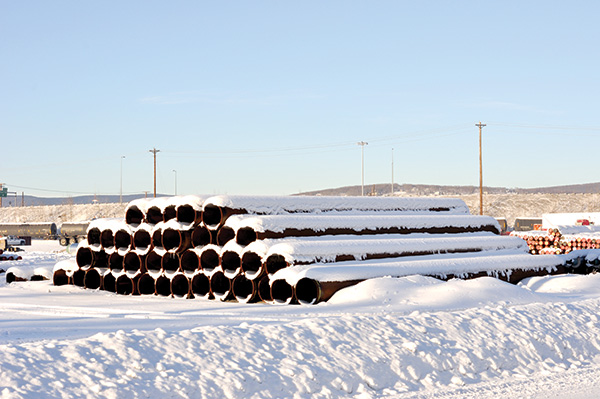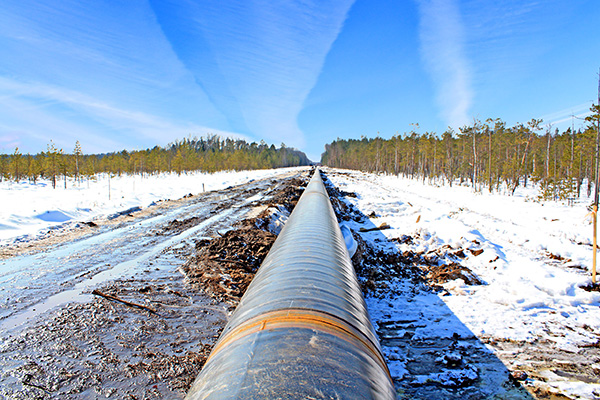June 2019, Vol. 246, No. 6
Features
Colorado: Litmus Test for Oil, Gas Development’s Future
By Richard Nemec, Contributing Editor
A glimpse at what is ahead for the oil and natural gas industry politically played out in the first quarter of 2019 in Colorado, a state long recognized for its ability to balance energy development, economics and the environment. That delicate balance has now been thrown off kilter as a surge of progressive Democratic leaders in the governor’s office and legislature has coalesced to upend decades of semi-peaceful co-existence between burgeoning well sites and equally expansive communities.
Some political sleight of hand and a solid Democratic majority throughout state government resulted in a complete regulatory coup following eight years of a more moderate Democratic governor and former petroleum geologist who was often praised within and outside his state as a master at balancing the three “E’s” – energy, economics and the environment. Now a candidate for the Democratic nomination for president, John Hickenlooper, must be feeling letdown.
When Chris McGowne, associate director at the Colorado Petroleum Council (CPC), sat down in late March to testify to the Colorado House Finance Committee, he could easily assume that his economic arguments supporting responsible oil and gas development were a slam dunk, but instead he found himself in front of a high-speed political freight train that was bearing down on the industry.
His message was to warn lawmakers they were not considering the economic harm the proposed restructuring of the oil and gas regulatory structure could do to the state’s economy that draws billions of dollars in economic multipliers, along with another billion dollars in annual public funds for schools, state parks, etc.
Like many other states with plentiful, commercially viable natural resources, Colorado residents and their elected officials may not realize that $31.4 billion comes annually to the state economy from oil and gas, along with 232,000 jobs, McGowne told the committee, which would vote out Senate Bill (SB) 181 along partisan lines by the end of a lengthy hearing.
“Our industry is one of the pillars of Colorado’s economy and foundational to the budget priorities our elected leaders set each year,” he added, without having a lot of effect.
McGowne and the lawmakers all knew of the state’s recent history of repeated political clashes at the local and state levels over who should oversee oil and gas development, which has ramped up considerably with the shale boom of the past decade.
More than a half-dozen towns and counties over the past seven years have imposed various bans and moratoria on drilling, particularly hydraulic fracturing. There is somewhat of a love-hate attitude toward oil and gas operations, which are prevalent in the Denver-Julesburg (DJ) Basin north and east of Denver and along the Western Slope in the Piceance Basin.
A former Arapahoe County elected-Commissioner John Brackney, a native Coloradan, calls his home state “an interesting place that unless you’re real familiar with it, people continue to misread on all sides.” Brackney said the oil and gas community continues to misread the will of the people.
“We have a heavy environmental streak; we love these mountains and take our air quality seriously,” he opined. “The oil and gas industry is misunderstood, as well as the voters.”
Brackney likes to quote a lyric from a Jimmy Buffett song: “Occupational hazard means the occupation is just not around.” To this public policy/community relations manager for an Internet service company, there is “some inherent danger in producing oil and natural gas with all those pipes and heavy machinery and digging into Mother Earth, but it also provides high-quality, high-paying jobs that create wealth. To mess with that is a serious mistake, too.”
Oil and gas is part of the Colorado fabric and part of the state’s pride, and both Democratic and Republican voters understand that, said Brackney, who talks confidently about a proposed statewide ballot referendum in November that he thinks will repeal SB 181.
“Our proposal is to take politics out of the process and make it more like a re-districting commission,” he said.
At the end of March, the elected representatives in the lower House gathered late into the evening debating SB 181 and whether they should take the risk of losing hundreds of millions of dollars in revenues for public education from the oil and gas sector.
“Oil and gas development is real economic development,” said a representative, who has three dozen rural schools that will lose out if the oil and gas reform measure becomes law. She called mineral rights “hope” for modest income rural landowners. She asked colleagues to remember these people who need this hope when they vote on the measure.
A Moffitt County representative said the entire County Commission was opposed to the legislative bill, noting that 61% of the county’s revenue comes from taxes on oil/gas and coal revenues. According to a University of Colorado business school report commissioned earlier this year by the Colorado Oil and Gas Association (COGA), oil and gas, alone, is responsible for at least seven distinct streams of public revenue, and the assessment rates on oil and gas lands value is 75% to 87.5%, compared to 29% on the general assessment rate for corporate properties.
In a month’s time, the end of the accelerated process turned out to be the state Senate considering an amended version of SB 181. The lawmakers gave some relatively minor concessions to oil and gas operators, but otherwise agreed to a bill that was not good for the future development of oil and gas in Colorado. The business community and residents realized the state’s economy likely will take some hits this year and next, unless the industry-backed statewide ballot measure passes in the fall to repeal the new law.
Amid a rush of committee hearings in both branches of the state General Assembly, Colorado’s oil and gas community converged on the Capitol in Denver to make industry voices heard, even if not totally heeded. A rally in early March preceded the first committee hearing in the Senate with lawmakers’ intent on adding significant new regulation to an industry that insisted it was already among the most closely regulated in the nation. There was a new threshold for important aspects of the oil/gas business, including operators’ combining mineral rights for drilling under the forced pooling practice.
Details of the new law include a state General Assembly estimate that it will only add $3 million in annual costs to the state budget and understanding the purpose and role of the Colorado Oil and Gas Conservation Commission (COGCC), its rules, fees and other arcane facts, and various functions that the commission runs, including a state environmental response fund and statutory pooling of mineral interests.
New rules are established for forced pooling of mineral rights. This is when operators combine mineral rights for drilling, even when some property owners object. Now operators need the consent of only one owner, and the original SB 181 would have required at least 50%, but House members changed that to 45% to avoid giving the largest Colorado E&P, Anadarko, a virtual monopoly regarding pooling. When mineral rights owners cannot be located, they are not included in the calculation.
Still, the impact of local governments is where the biggest heartburn grows for oil and gas operators. The new law removes the long-held state-preemption of oil and gas regulations. While the original bill language called out zoning, odors and noise for local control, it was felt this could lead effectively to bans and moratoriums on energy development, so at the industry’s request, lawmakers amended the bill language to put some limits calling for “reasonable” actions by local authorities; actions in a “reasonable manner,” and local rules/standards that are “necessary and reasonable.” The actions also are explicitly limited to the local county or city’s own boundaries, preventing city-county disputes.
The passage of SB 181 with Gov. Polis’ support is the latest in a long line of statewide ballot measures and local government ordinances in Colorado aimed at the issue of more local control over oil/gas operations, including a series of bans on hydraulic fracturing (fracking) starting six years ago. Colorado voters in November 2018 rejected by a 57% margin Proposition 112, a measure that would have prevented some drilling in the state. SB 181 was sponsored by House Speaker KC Becker and Senate Majority Leader Steve Fenberg.
For the rest of 2019, the Colorado oil and gas space finds itself in an unwelcome web of uncertainty, but for the short term some operators may have hedged their bets by applying for added permits to keep them busy during this stressful period, although statistics from the COGCC don’t show much. Permitting has stayed down and stable since December last year, compared to the fall.
Prior to statewide ballot measure Prop 112, there was an acceleration as location permits and drilling permits went from 67 and 716, respectively, last September to 97 and 1,091, respectively, last October – hitting 100 and 829 in November. Those same location/drilling permits fell to 56 and 605, respectively, in December last year, staying at or below those levels in the first three months of 2019.
Throughout the accelerated legislative process, SB 181 drew vocal opposition, and it continued in the aftermath of the new law’s passage. Opponents are hoping to get a measure on the November statewide ballot that would essentially repeal this legislation. In the meantime, industry leaders will continue to try to work with the SB 181 supports on the new law’s implementation.
In the face of the heightened political moves, COGA and CPC stressed the importance of the industry to the state economically, citing the earlier-referenced report from the global energy management program in the University of Colorado Business School in Denver, dissecting the impact of both midstream and upstream operations in the state, including 89,000 jobs and $13.5 billion in gross domestic product (GDP).
The latest university business school report tallied $993.3 million in annual fiscal revenue flows from the industry through personal and corporate income taxes, both state and federal land/mineral fees, property taxes, state severance taxes, and a state oil/gas conservation/environmental fund.
“Unlike other industries, oil and natural gas extraction establishments pay royalties and taxes on the value of production, in addition to taxes paid on earnings,” the report stressed. “The state receives royalties for oil and gas production from state and federal lands and severance taxes on all production in Colorado.”
The principal researcher for the report, Michael Orlando, managing director of EconOne Research Inc., concluded that public resources generated by oil and gas development are “clear and necessary” to Colorado’s financial health. The oil/gas impact can be seen in schools, parks, open space infrastructure throughout the state – “from the eastern plains to the western slope to the streets of downtown Denver.”
The largesse emerges in a variety of public-sector projects from a few hundred thousand dollars to $2 million, small but important undertakings on the local level, Orlando points out: A fire-rescue station in Leadville in Lake County, broadband in Garfield and Pitkin counties, an historic courthouse renovation in Montrose County, and road and bridge improvements in Mesa County.
If Colorado residents continue to equate the local public works to the revenue streams from oil and gas, it is likely that SB 181, which was expected to be signed by Gov. Polis in mid-April, ultimately will be repealed or watered down.
As the spring thaw set in around Denver and the Rockies baseball team played its opening home series of the new season, a calming, “wait-and-see” attitude spread over both the industry backers and opponents. While local news media reports highlighted Polis being “thrilled” with the quick passage of the legislation, it had still not landed on his desk when this writer finished his report the second week in April. Local reports said there was a 30-day window for the governor to act; a governor’s office spokesperson told P&GJ that the process gives him 10 days once the complete legislative package reaches his office.
Polis eventually will sign it, calling it a “meaningful step forward” for the state by protecting the health and safety of families. Nevertheless, a solid block of Republicans opposed SB 181 as a job-killer that will harm rural areas economically and deter investment in the oil/gas sector. COGA and CPC “remain firmly opposed,” warning about the uncertainty and damage that will be coming.
Industry representatives prefer to see the accelerated political and economic shift they just experienced as a “beginning, not an ending.” They emphasize that they will continue to dialogue with the governor’s office and legislature during the implementation, pointing out that there still a number of questions to be answered:
- Given an entirely revised, full-time COGCC, how will it perform compared to the old panel?
- What kind of new rules and regulations are it likely to create?
- How are the local governments likely to respond toward oil/gas operators?
In many cases, industry workers and executives are neighbors of the local government officials. Some companies, such as Denver-based Extraction Oil & Gas Inc., have model agreements for their future development as Extraction does with the town of Broomfield that officials called “one of the most thoughtfully designed oil and gas developments in the country.”
Last year, Broomfield officials conditionally approved a 1,500-page comprehensive drilling plan by Extraction for six well pads.
More recently in March this year, the COGCC granted Extraction a forced pooling exemption to move forward with a drilling project in the DJ Basin. It was a request corresponding to Extraction’s permit to drill in the city and county of Broomfield where last summer the city approved a detailed plan by Extraction.
COGCC Commissioner Howard Boigon lauded Extraction and Broomfield officials for going “above and beyond what was needed to assure public health and safety” in their agreement. Extraction officials said COGCC approval recognizes that the company has satisfied local concerns.
The lesson here is that all of this happened before SB 181, the new oil and gas playing field being erected in Colorado. Public policy and economic development were both well served without the new regulatory landscape and rules. P&GJ








Comments